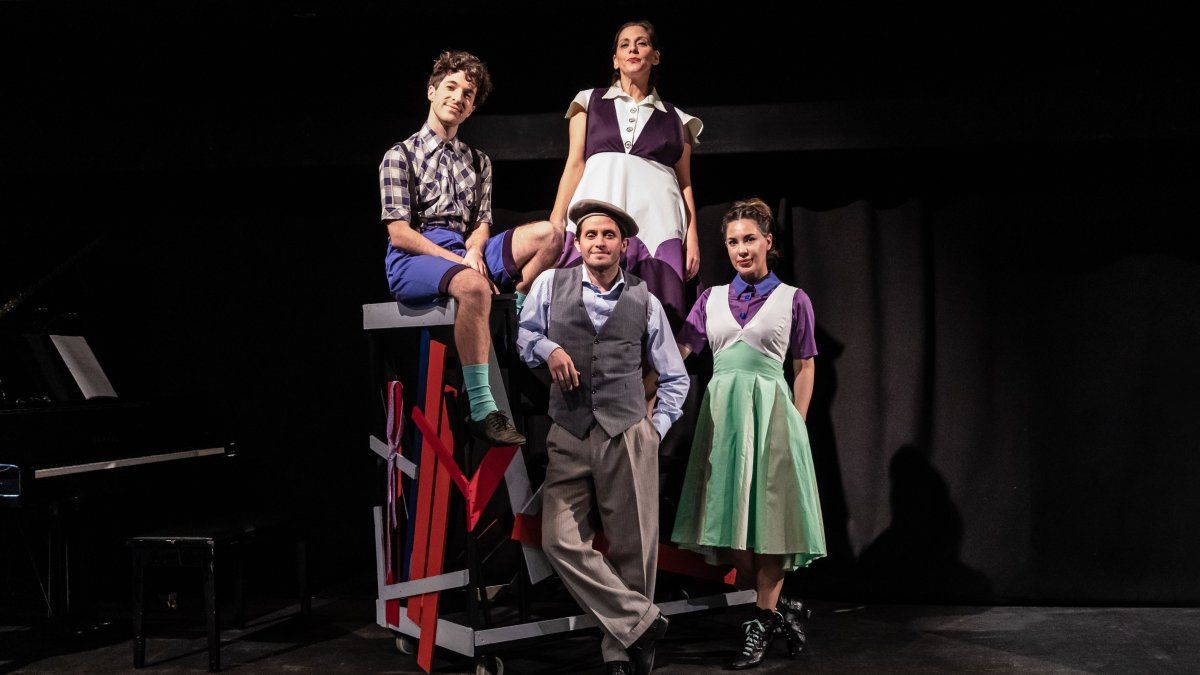Come back on Saturday “I give peace to the barbarian,” of Pablo Gorlero, which brings to the stage for an adult audience the universe of Maria Elena Walsh, a creator who has marked the lives of several generations. With the performances of Mariano Magnifico, Flavia Pereda, Julian Pucheta and Deborah Turzathe work in variety format, unfolds through four representative figures of the dialectic of Maria Elena. Different facets of his personality are interpreted by The one in love, the one who protests and The child manwho in a certain sense are one and try to “revive” Magoyathe one who believes everything.
With vocal and musical direction by Juan Ignacio Lopez, coreography and steering assistance Marina Svartzman, will be presented on Saturdays at 9:30 p.m. at Andamio 90. We spoke with Pucheta and Turza.
Journalist: How is this work for an adult audience about María Elena Walsh? What aspects of her life are covered?
Julian Pucheta: It is based on her texts and songs, of course the best known are those we grew up with since kindergarten. That mordacity and irony, that very particular vision of the world, which made her fight and be a cultural hero. Gorlero wove together those four characters who are related through “La cigarra”, “Barco quieto”, “Requiem para una madre”, “Tango Magoya”, “Los Ejecutivos”, etc. We listened to them all our lives and perhaps we didn’t know they were by María Elena. It is not a biography of her nor a linear plot.
Deborah Turza: It is a variety show, as she liked it so much. The characters represent different facets of María Elena, aimed at an adult audience. Many were censored and forgotten, so this material is being rescued. I play the protesting Maria Elena, the most feminist and rebellious. Flavia Pereda is the one in love, there is the child-man, Mariano Magnífico, and Pucheta is Magoya. They are the different María Elenas that lived in her.
Q: How can we not associate Maria Elena’s songbook with children?
JP: I am in a dilemma about what is for children and what is not. Of course one associates it with “A toma el té” and other beautiful songs. I have no doubt that we lose the ability to imagine as we grow up, we have a more limited thought in that sense, our brain gets into another mood. I am doing Hugo Midón’s “Vivitos y coleando” where it says “There are no flowers for children, there are flowers”. By doing this work I rediscovered Maria Elena from another place, you see another facet, you get to know another part of her work and with another depth.
DT: There are songs that are in a place in our hearts and transport us to the happiest moment of our lives, childhood, where everything happens. Revisiting that María Elena is like returning from where we are now. There are also journalistic texts.
Q: What are shows for children like today, as opposed to what Maria Elena proposed?
JP: Today I see everything more literal, flat, immediate, everything made to provoke an effect that if it doesn’t exist now, it no longer exists. Everything is about generating an effect in a minute, impregnated with the culture of the video minute. In contrast, I see transcendence and that which extends over time and crosses generations. Hugo Midón has been around for three generations and a beautiful harmony is generated that has to do with returning to the sources and education. There are new forms of expression today, there are new generations that were born with another language and I see that we are in a hurry, nothing has a future because new things appear all the time. It is the culture of the disposable. And those from before had the virtue of becoming classics.
DT: There are many bands and music with very interesting proposals such as “Canticuenticos” and “Vuelta Canela”, very poetic and humorous, related to María Elena. There is also a more commercial place with more spectacular proposals that are also welcome, but we must not forget to feed poetry, emotion, music rich in harmony, rhythm, our Latin American music.
Q: How do you see the musical theatre scene with so many small and large format musicals?
JP: I see the billboards overflowing and we are a mecca of independent theatre, we are a breeding ground and there is a niche for the public for that. We find new ways to tell our story through musicals and theatre is turning to plays with music as the dramatic thread. Now everything has live music, it’s great. I celebrate our musicals and also those that come from outside, and although tickets are expensive and make the theatre a luxury, the public goes. The context is hostile to the pocketbook but it is one of the strongest arts.
DT: Theatre and musicals have a great place, they are a treasure that must be taken care of. There are great, excellent musicals and other off-the-cuff ones created here through self-management, with a very particular Argentine brand. Here we create magic with two or three things, that is spectacular. I celebrate that Argentine theatre is “alive and kicking” and here I mention Midón and Gianni who are a legacy that continues.
Q: How do you see culture?
JP: Attacked and battered, it is seen as demonized by ideology when culture is much more than art, it is a channel to awaken the individual, the other, and create social fabric. Culture always finds a way. There is a democratization of forms of expression that bring art to all corners, so that a kid in a shantytown can make music, poems, publish a book. You can’t kill, you can film with whatever you have in your hand, you can do theater in squares.
DT: We are being hit hard, it is not just an economic issue but there is more. Maria Elena had many censored songs that are in this show and she had to go into exile. We are in a delicate moment that needs attention. It would be very sad not to be able to talk about issues in state settings. Doing this show is a breath of fresh air, it is a place of resistance and I believe in tenderness, which is also revolutionary.
Source: Ambito
I am an author and journalist who has worked in the entertainment industry for over a decade. I currently work as a news editor at a major news website, and my focus is on covering the latest trends in entertainment. I also write occasional pieces for other outlets, and have authored two books about the entertainment industry.




